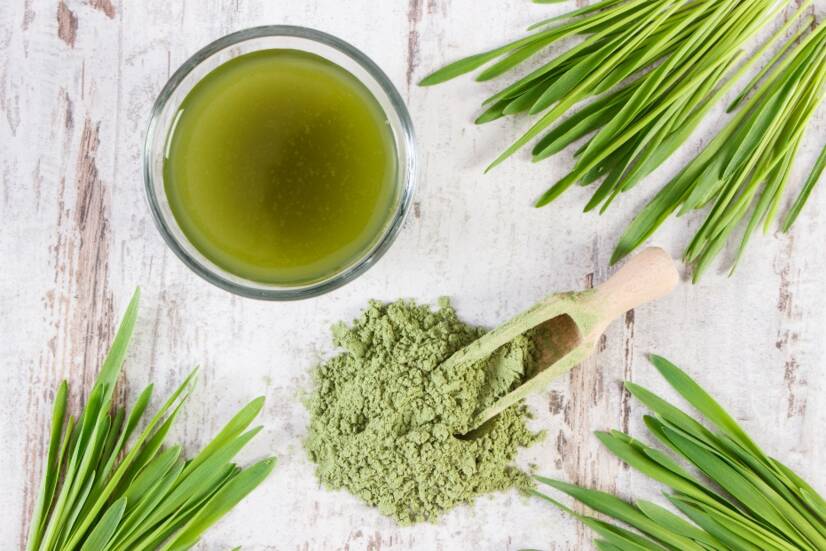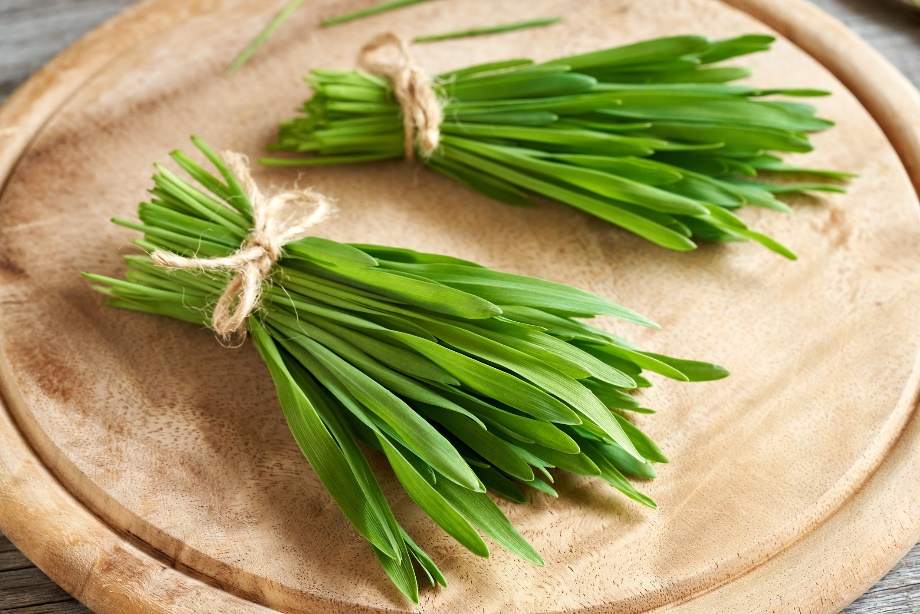Green (young) barley and its health benefits. Does it help with weight loss?

Green barley, also known as young barley, is a relatively popular green superfood. Thanks to its high nutritional values, it has beneficial effects on health. What substances does green barley contain? Does it really help with weight loss?
Article content
Green barley, together with chlorella and spirulina, is one of the so-called green trio of superfoods. It is a food with high nutritional value and content.
Barley has a positive effect on the immune system, digestion, cardiovascular system, detoxification of the body and many others.
Composition, effects, home growing, real effect on weight loss and many other interesting information you will learn in the article.
What is green barley?
Young barley is a plant and variety of barley originating from grain fields. Currently, it is grown almost all over the world in temperate climates.
The plant germinates, grows and with the help of water, soil and sunlight, acquires a variety of antioxidants, vitamins, minerals and other beneficial substances.
To process barley into a nutritional supplement, a green shoot of approximately 20-25 cm in height is harvested. This is the one that contains the greatest amount of active substances in the vegetative phase.
The plant is dried using special methods to preserve the maximum amount of beneficial substances.
The form of processing of green barley is mainly powder and tablets. The powder is used to be poured over a liquid or added to a drink/food. Fruit juices/smoothies are particularly recommended. The tablet in a food supplement is consumed orally.
Green foods have been shown in many studies to have antioxidant effects and a protective effect against intoxication of the body. They thus represent a natural supplement for the prevention and elimination of many diseases of civilization.
What does green barley contain?
Young barley is rich in powerful antioxidants, flavonoids, essential amino acids, chlorophyll, fiber, vitamins and minerals.
Thanks to the B vitamins, barley is particularly beneficial for the nervous system, metabolism and skin. Vitamin C in turn strengthens immunity and the body's overall defences. The composition also contains vitamins of groups A, E, H and K.
Of the minerals, magnesium, potassium, calcium, phosphorus, iron, selenium and zinc should be mentioned.
Many studies have shown that flavonoids have anti-inflammatory, adaptogenic and, in particular, antioxidant effects. They protect cells from the toxic effects of harmful substances.
They restore the natural state of cells, protect cells from oxidative stress and thus slow down degenerative processes in the body.
Thanks to its content, barley grass supports the immune system, regulates blood pressure, supports digestion and has detoxifying and anti-inflammatory effects.

Health benefits of green barley
Green superfoods and their beneficial effects on the human body have been the subject of many studies and researches.
Possible effects of young barley:
- Antioxidant effect
- Detoxifying effect
- Anti-inflammatory effect
- Adaptogenic effect
- Strengthening of the immune system
- Support energy metabolism
- Support of the digestive system
- Support liver health
- Lowering cholesterol levels
- Support blood formation
- Blood pressure regulation
- Supporting the cardiovascular system
- Promoting skin and skin health
- Antidepressant effect
- Promoting quality sleep
- Support hormonal balance
Antioxidant effect
Green barley contains powerful antioxidants. It helps to neutralize the effects of free radicals, preventing a range of diseases caused by oxidative stress. Oxidation can cause damage and premature aging of cells and tissues.
Antioxidants are substances that destroy free radicals - waste products of the body. They are found mainly in fruits and vegetables and are abundant in barley.
Detoxifying effect
The cleansing power of green barley prevents intoxication by harmful heavy metals (lead). The main representatives of the detoxifying effect are the minerals zinc, selenium and copper.
Chlorophyll contained in the barley plant supports the metabolic processes of the liver and stimulates the excretion of waste substances from the body.
Barley helps to balance the pH of the body and thus establish an acid-base balance. Barley shoots are alkaline and their digestion helps to maintain the balance of acidity of the internal environment.
Strengthening the immune system
Thanks to its composition full of vitamins and minerals, green barley supports the strengthening of the body's immunity and defences. It thus has a natural preventive and curative role in various civilisation diseases.
Many studies point to its anti-inflammatory, antioxidant, hypolipidemic and antidiabetic effects. Its anti-cancer potential is also being investigated.
Barley's properties include an adaptogenic effect that harmonises the physical and mental state of the body. It contributes to the hormonal balance of the various internal systems of the body, including the reproductive system (physiological cycle and menstruation).
Support for the cardiovascular system
Green barley (iron, potassium, folic acid) has a positive effect on promoting the production of red blood cells, mainly due to its high content of iron, folic acid and potassium. It has a positive effect on blood formation, bone marrow and oxygen transport throughout the body.
It also helps with blood clotting. The use of barley reduces the risk of certain cardiovascular diseases. It has a beneficial effect against the deposition of unwanted cholesterol and thus improves blood count.
Promotes skin health and condition
By supporting digestion, blood formation and its regenerative effect, barley helps to prevent the signs of ageing by slowing down the ageing of cells. The use of barley promotes the production of collagen, which prevents skin ageing.
Last but not least, it counteracts many skin problems such as acne, eczema and dermatitis.
The skin benefits from the ingredients beta-carotene, chlorophyll and vitamin E, which have anti-inflammatory effects. Chlorophyll, in turn, protects the body against photo-ageing caused by frequent exposure to sunlight.
Barley and diabetes mellitus
One of the main effects of barley is to affect elevated blood sugar levels. It improves blood count and regulates or lowers blood glucose levels.
It promotes the endocrine activity of the pancreatic organ and the production of the hormone insulin. Thus, it naturally promotes the reduction of insulin resistance and thus the body's inability to absorb sugar.
Green barley and weight loss: does it really help?
Green barley neutralises the acidic environment in the body, thus supporting the thyroid gland. It supports energy metabolism and fat burning.
Thanks to its chlorophyll, potassium and fibre content, barley supports physiological digestion, the balance of the intestinal microflora and bowel movements.
However, if we do not change the basics of our diet, the extra pounds will not come off even with daily consumption of green barley.
Dietary modification, a moderate calorie deficit and regular physical activity are necessary for healthy and effective weight loss. However, green barley can help you achieve your dream goal.
Who should be vigilant when consuming barley?
Although the green trinity of superfoods is healthy and its content is beneficial to the human body, some individuals should be wary of contraindications.
Severe allergies, especially to grasses, could in rare cases cause an allergic reaction in the form of indigestion, itchy skin and other common manifestations of food and respiratory allergies.
If you are taking blood thinners or are fresh from inflammation or surgery, it is advisable to consult a doctor when eating barley. Barley can affect blood clotting.
As for pregnant women, there are no negative effects of taking moderate doses of green barley. However, due to the many effects of barley on the cardiovascular system, individual consultation with a gynecologist is necessary.
Green barley - method of use and recommended daily dose
The recommended daily dose is not officially established. However, for healthy individuals, approximately 1 teaspoon (powder) once or twice a day is recommended. It is advisable to follow the recommended dosage listed on the packaging of the specific manufacturer.
Green barley should not be cooked to preserve the beneficial substances and taste. The temperature of the food should be kept below 40 °C.
When starting to take green barley, it should be taken into account that temporary difficulties may occur due to the new type of food.
Common temporary symptoms include, for example, mild diarrhoea. It is therefore necessary to proceed slowly and gradually.
In case of negative symptoms, do not take green barley and consult a doctor.
Green barley can be consumed by adding the powder to water, smoothies or fruit juices. It can also be added to food. However, the food should not be too hot.
Growing green barley at home
Growing green barley at home is easy. You don't need anything special to grow it apart from the seeds themselves. Barley germinates quite quickly. Pour water into a container (pot) and put the barley seeds you have bought into it.
After one day, pour out the water, remove the soaked barley and add the necessary substrate (soil) to the pot. Spread the soaked seeds evenly over the substrate and cover with a thin layer of substrate - just enough to cover the seeds.
Place a layer of foil over the pot (container) and remove it after one day.
Irrigate the plant regularly with water, e.g. from a sprinkler, but beware of high humidity and mould. After a few days you should have green grass-like blades that can be eaten.
Related










